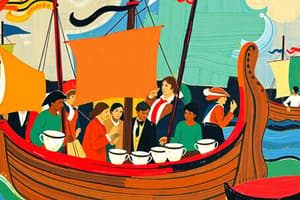Podcast
Questions and Answers
What angered the colonists about the Tea Act?
What angered the colonists about the Tea Act?
It made the colonists feel they were being taxed unfairly.
What were the protestors protesting during the Boston Tea Party?
What were the protestors protesting during the Boston Tea Party?
The Tea Act
How did the British react to the Boston Tea Party?
How did the British react to the Boston Tea Party?
They enacted the Intolerable Acts.
Which of these changes were created by the Intolerable Acts?
Which of these changes were created by the Intolerable Acts?
What did the British hope to accomplish with the Intolerable Acts?
What did the British hope to accomplish with the Intolerable Acts?
How did the colonists react to the Intolerable Acts?
How did the colonists react to the Intolerable Acts?
What two reasons did the British have for marching on Lexington and Concord?
What two reasons did the British have for marching on Lexington and Concord?
Why are the Battles of Lexington and Concord significant?
Why are the Battles of Lexington and Concord significant?
Why was the Boston Tea Party seen as an act of rebellion?
Why was the Boston Tea Party seen as an act of rebellion?
One of the Intolerable Acts of 1774 required Massachusetts colonists to seek what?
One of the Intolerable Acts of 1774 required Massachusetts colonists to seek what?
In what way was colonial reaction to the Stamp Act, the Townshend Acts, and the Tea Act similar?
In what way was colonial reaction to the Stamp Act, the Townshend Acts, and the Tea Act similar?
How did the Massachusetts Government Act change the way Massachusetts was governed?
How did the Massachusetts Government Act change the way Massachusetts was governed?
In response to the Tea Act of 1773, many colonists joined?
In response to the Tea Act of 1773, many colonists joined?
Which best describes the First Continental Congress of 1774?
Which best describes the First Continental Congress of 1774?
What was one action that was taken by the First Continental Congress?
What was one action that was taken by the First Continental Congress?
What increased tension between the colonists and the British government in 1774?
What increased tension between the colonists and the British government in 1774?
What happened on Lexington Green on April 19, 1775?
What happened on Lexington Green on April 19, 1775?
What did the outcomes of the battles of Lexington and Concord show?
What did the outcomes of the battles of Lexington and Concord show?
Tension grew in 1775 as British troops controlled Boston. In response, what did the colonists do?
Tension grew in 1775 as British troops controlled Boston. In response, what did the colonists do?
How did Parliament respond to the protests against the Tea Act?
How did Parliament respond to the protests against the Tea Act?
Flashcards are hidden until you start studying
Study Notes
Colonial Resistance Overview
- Colonists were angered by the Tea Act, perceiving it as an unfair tax burden.
- The Boston Tea Party was a direct protest against the Tea Act, involving the dumping of tea into Boston Harbor.
British Response
- In retaliation to the Boston Tea Party, Britain enacted the Intolerable Acts, aimed at punishing Massachusetts.
- The Intolerable Acts included the enforcement of new quartering for British troops, closure of Boston Harbor, and imposition of a military government in Massachusetts.
Colonial Reaction
- Colonists rallied in support of Massachusetts, forming the Continental Congress to organize resistance against British policies.
- The First Continental Congress convened in 1774, resulting in a petition to the king for the repeal of the Intolerable Acts.
Prelude to War
- British troops marched on Lexington and Concord to capture rebel leaders and seize ammunition stores.
- The Battles of Lexington and Concord on April 19, 1775, marked the initiation of the American Revolution, showcasing colonial readiness for conflict.
Key Legislation and Protests
- The Intolerable Acts required Massachusetts colonists to seek approval for local town meetings, altering governance to a military regime.
- Colonists’ responses to laws like the Stamp Act, Townshend Acts, and Tea Act involved widespread boycotts of British goods.
- The Sons of Liberty emerged as a key group opposing the Tea Act, promoting collective resistance.
Escalating Tensions
- Tensions heightened in 1774 with the implementation of the Intolerable Acts, leading to increased animosity between colonists and British authorities.
- By 1775, with British troops controlling Boston, colonists formed armed militias as a defensive measure.
Significance of Events
- The Boston Tea Party is considered a seminal rebellious act due to its unlawful destruction of property in protest.
- The outcomes from the Battles of Lexington and Concord demonstrated the colonists' willingness and capability to confront British forces.
Studying That Suits You
Use AI to generate personalized quizzes and flashcards to suit your learning preferences.




